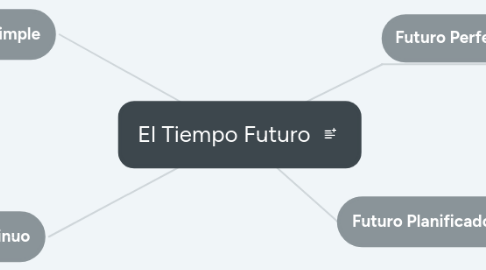
1. Futuro Simple
1.1. Usos
1.1.1. Acciones o estados en el futuro (no planes)
1.1.1.1. They will dance all night long. (Bailarán toda la noche.)
1.1.2. Promesas o intenciones
1.1.2.1. I will always help you. (Siempre te ayudaré.)
1.2. Estructura
1.2.1. Affirmative Sentences
1.2.1.1. Sujeto + “will” + verbo principal.
1.2.1.1.1. She will [She’ll] arrive late. (Llegará tarde.)
1.2.2. Negative Sentences
1.2.2.1. Sujeto + “will” + “not” + verbo principal.
1.2.2.1.1. She will not [won’t] arrive late. (No llegará tarde.)
1.2.3. Interrogative Sentences
1.2.3.1. “Will” + sujeto + verbo principal?
1.2.3.1.1. Will she arrive late? (¿Llegará tarde?)
2. Futuro Continuo
2.1. Usos
2.1.1. Describe la acción que estará en desarrollo en el futuro y que será interumpida. (El verbo que interrumpe está en presente simple)
2.1.1.1. Will it be [Is it going to be] raining when l leave? (¿Estará lloviendo cuando salga?)
2.1.2. Habla sobre acciones en un tiempo específico del futuro.
2.1.2.1. Paula will be [Paula’s going to be] living in Spain next April. (Paula estará viviendo en España el próximo abril.)
2.2. Estrutura
2.2.1. Affirmative Sentences
2.2.1.1. Sujeto + “will be” + verbo+ing
2.2.1.2. Sujeto + verbo auxiliar (to be) + “going to be” + verbo+ing
2.2.2. Negative Sentences
2.2.2.1. Sujeto + “will” + “not” + “be” + verbo+ing
2.2.2.2. Sujeto + verbo auxiliar (“to be”) + “not” + “going to be” + verbo+ing
2.2.3. Interrogative Sentences
2.2.3.1. Verbo auxiliar “will” + sujeto + "be"+ verbo+ing?
2.2.3.2. Verbo auxiliar (“to be”) + sujeto + “going to be” + verbo+ing?
3. Futuro Perfecto
3.1. Usos
3.1.1. Se usa el futuro perfecto para acciones que ya se habrá terminado antes de otra acción en el futuro. También, se puede usar para expresar que algo va a suceder antes de un momento específico en el futuro.
3.1.1.1. Is Mike going to have trained enough before his first game? (¿Mike habrá entrenado lo suficiente antes de su primer partido?)
3.1.2. Utilizamos el futuro perfecto para mostrar que algo va a continuar hasta otra acción en el futuro.
3.1.2.1. Next week, I’ll have lived in Germany for 1 year. (La semana que viene habré vivido en Alemania desde hace 1 año.)
3.2. Estructura
3.2.1. Affirmative Sentences
3.2.1.1. Sujeto + “will have” + participio pasado.
3.2.1.2. Sujeto + verbos auxiliar (to be) + “going to have” + participio pasado.
3.2.2. Negative Sentences
3.2.2.1. Sujeto + “will” + “not” + “have” + participio pasado.
3.2.2.2. Sujeto + verbo auxiliar (to be) + “not” + “going to have” + participio pasado.
3.2.3. Interrogative Sentences
3.2.3.1. “Will” + sujeto + “have” + participio pasado?
3.2.3.2. Verbo auxiliar (to be) + sujeto + “going to have” + participio pasado?
4. Futuro Planificado ó Going to
4.1. Usos
4.1.1. Se usa “going to” para planes. Se indica la intención de hacer algo.
4.1.1.1. We are going to have a party tonight. (Vamos a dar una fiesta esta noche.)
4.1.2. Cuando hay evidencia de que algo va a pasar usamos “going to”.
4.1.2.1. It is going to be a great party. (Será una fiesta genial.)
4.2. Estructura
4.2.1. Affirmative Sentences
4.2.1.1. Sujeto + verbo auxiliar (to be) + “going to” + verbo principal.
4.2.1.1.1. She is going to arrive late. (Va a llegar tarde.)
4.2.2. Negative Sentences
4.2.2.1. Sujeto + verbo auxiliar (to be) + “not” + “going to” + verbo principal.
4.2.2.1.1. She is not going to arrive late. (No va a llegar tarde.)
4.2.3. Interrogative Sentences
4.2.3.1. Verbo auxiliar (to be) + sujeto + “going to” + verbo principal?
4.2.3.1.1. Is she going to arrive late? (¿Va a llegar tarde?)
